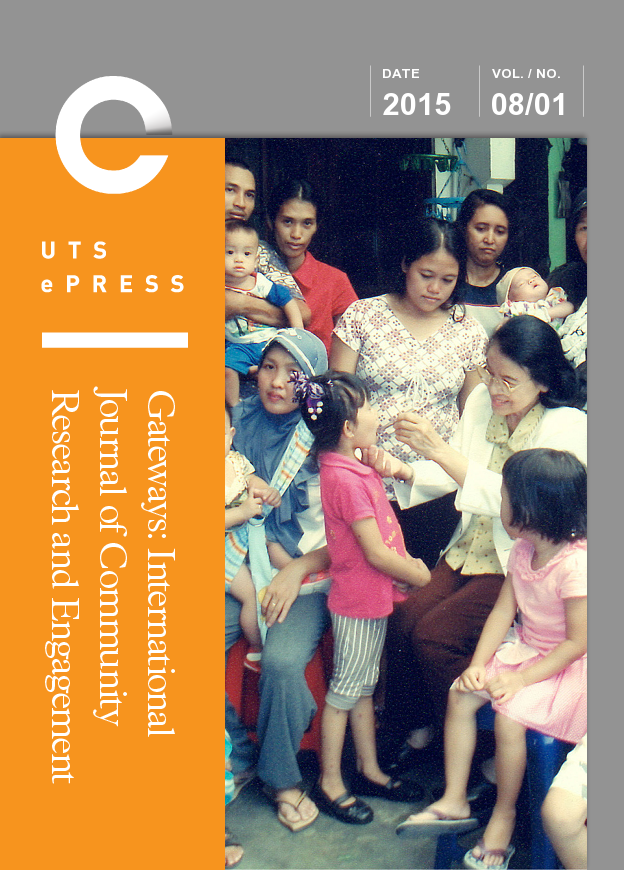Simulation as a tool for developing knowledge mobilisation strategies: Innovative knowledge transfer in youth services
Main Article Content
Abstract
While there are excellent models of knowledge mobilisation (KMb) that address the opportunity for co-production and sharing of best practice knowledge among human service professionals, it remains unclear whether these models will work in less formal settings like community-based non-government organisations (NGOs) where there are fewer resources for KMb. For three days, 65 policy-makers, senior staff of NGOs, mental health professionals, KMb specialists and youth participated in a set of simulation exercises to problem solve how to mobilise knowledge in less formal settings that provide services to children and youth in challenging contexts (CYCC). Based on simulation exercises used in other settings (such as the deployment of international aid workers), participants were first provided with reports synthesising best practice knowledge relevant to their workplaces. They then engaged in an appreciative inquiry process, and were finally tasked with developing innovative strategies for KMb. Observation notes and exit interviews were used to evaluate the process and assess impact. Findings related to the process of the simulation exercises show the technique of simulation to be useful but that it requires effort to keep participants focused on the task of KMb rather than the content of best practices within a focal population. With regard to developing innovative KMb strategies, findings suggest that service providers in less formal community-based services prefer KMb activities that promote one-to-one relationships, including the participation of youth themselves, who can speak to the effectiveness of the interventions they have experienced. Unexpectedly, the use of electronic communication, including social media, was not viewed very positively by participants. These results suggest that the use of simulation to search for innovative KMb strategies and to problem solve around barriers to KMb has the potential to inform new ways of co-producing and sharing best practice knowledge among human service providers.
Keywords: simulation, knowledge mobilisation, high-risk youth, community-based mental health, knowledge brokers, barriers to knowledge exchange
Article Details
Issue
Section
Authors who submit articles to this journal from 31st March 2014 for publication, agree to the following terms:
a) Authors retain copyright and grant the journal right of first publication with the work simultaneously licensed under a Creative Commons Attribution License that allows others to share and adapt the work with an acknowledgement of the work's authorship and initial publication in this journal.
b) Authors are able to enter into separate, additional contractual arrangements for the non-exclusive distribution of the journal's published version of the work (e.g., post it to an institutional repository or publish it in a book), with an acknowledgement of its initial publication in this journal.
c) Authors are permitted and encouraged to post their work online (e.g., in institutional repositories or on their website) prior to and during the submission process, as it can lead to productive exchanges, as well as earlier and greater citation of published work (See The Open Access Citation Advantage Service). Where authors include such a work in an institutional repository or on their website (ie. a copy of a work which has been published in a UTS ePRESS journal, or a pre-print or post-print version of that work), we request that they include a statement that acknowledges the UTS ePRESS publication including the name of the journal, the volume number and a web-link to the journal item.
d) Authors should be aware that the Creative Commons Attribution (CC-BY) License permits readers to share (copy and redistribute the work in any medium or format) and adapt (remix, transform, and build upon the work) for any purpose, even commercially, provided they also give appropriate credit to the work, provide a link to the license, and indicate if changes were made. They may do these things in any reasonable manner, but not in any way that suggests you or your publisher endorses their use.
For Volume 6 (2013) and before, the following copyright applied:
Articles published by UTSePress are protected by copyright which is retained by the authors who assert their moral rights. Authors control translation and reproduction rights to their works published by UTSePress. UTSePress publications are copyright and all rights are reserved worldwide. Downloads of specific portions of them are permitted for personal use only, not for commercial use or resale. Permissions to reprint or use any materials should be directed to UTSePress.
